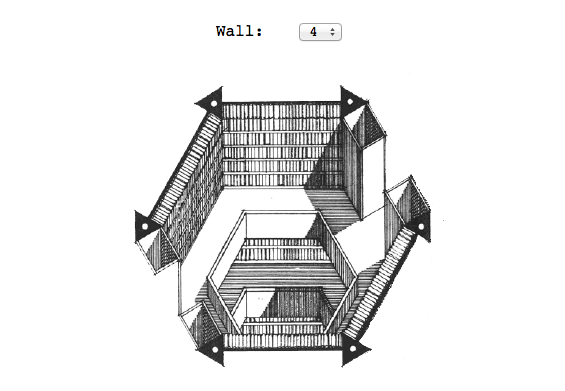A digital Library of Babel

In his 1941 short story "The Library of Babel," Jorges Luis Borges depicts a series of hexagonal rooms, their walls lined with bookshelves. These shelves contain books comprised of every possible combination of letters, spaces, commas, and periods. Some books are filled with nonsense but within the collection lies every literary text ever written, along with multiple permutations of each of these texts. The library's collection comprises all knowledge that is known or will be known.
Borges's vision has been realized in digital form by Jonathan Basile, a writer and coder who has brought the Library of Babel to life. Describing the library, Basile writes:
The Library of Babel is a place for scholars to do research, for artists and writers to seek inspiration, for anyone with curiosity or a sense of humor to reflect on the weirdness of existence - in short, it’s just like any other library. If completed, it would contain every possible combination of 1,312,000 characters, including lower case letters, space, comma, and period. Thus, it would contain every book that ever has been written, and every book that ever could be - including every play, every song, every scientific paper, every legal decision, every constitution, every piece of scripture, and so on. At present it contains all possible pages of 3200 characters, about 104677 books.
We find in Basile's library echoes of the disorientation faced by Borges's suicidal librarians confronted by so much information that books are rendered meaningless. Hovering over the navigation links on the site's front page produces an endless rearranging of letters, shuffling through letter combinations that render recognizable words like "Browse" in meaningless gibberish. Clicking "Random" generates a page of a book from the library, often a sea of letter combinations that seem to have little meaning. These pages offer the option to see an "Anglishized" version that identifies English words among the random letters. Users can also delve into their own hexagonal chambers - or hexes, and the site visualizes walls, shelves, and books to explore. The Reference Hex offers disoriented readers some guidance for making meaning of the library, from basic details on the construction of the library to suggestions for diving into the texts available.
A Library of Babel for the 21st century, Basile's representation speaks to the anxieties of big data. It brings to light the dizzying array of information available for access, the difficulty of comprehending the information glut, and concern for the knowledge to be found therein. It further evokes the tension between the access to knowledge made possible through computation and digital media and the challenges it brings. In doing so, Basile reminds us of that in the face of data, we are Borges's doomed librarians, ever negotiating questions of language and meaning.
Postcolonial digital poetics